人教版高二英语必修三Unit2-grammar
- 格式:ppt
- 大小:3.30 MB
- 文档页数:24
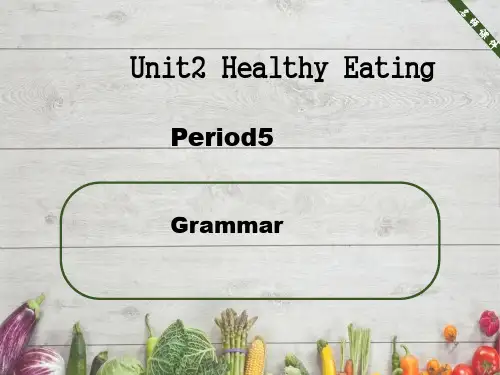
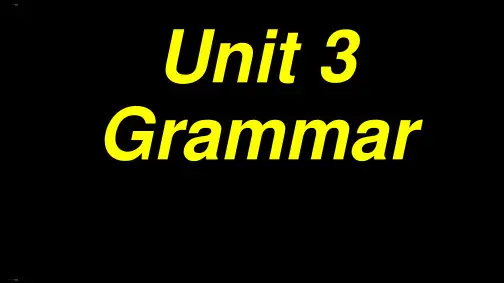
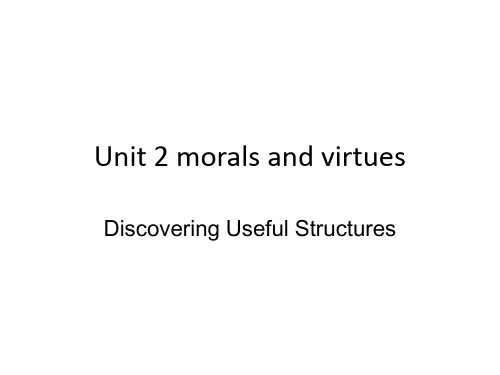
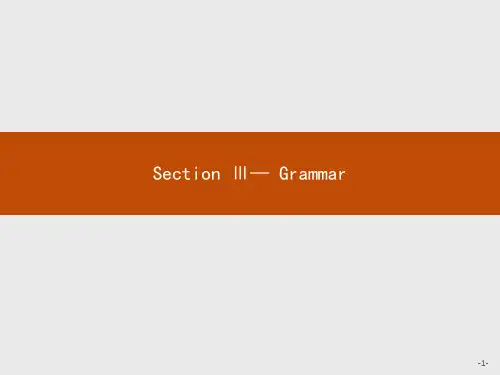
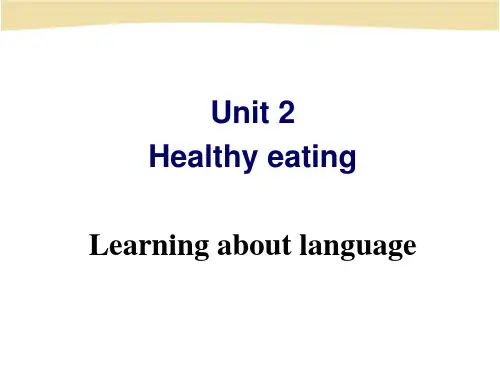
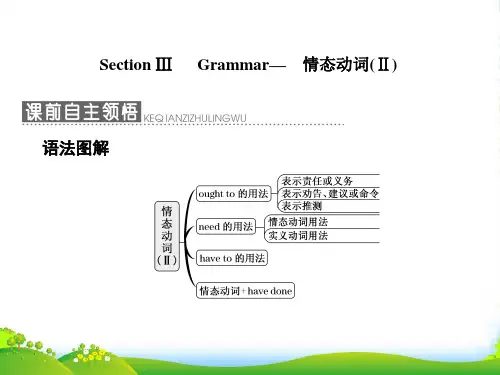
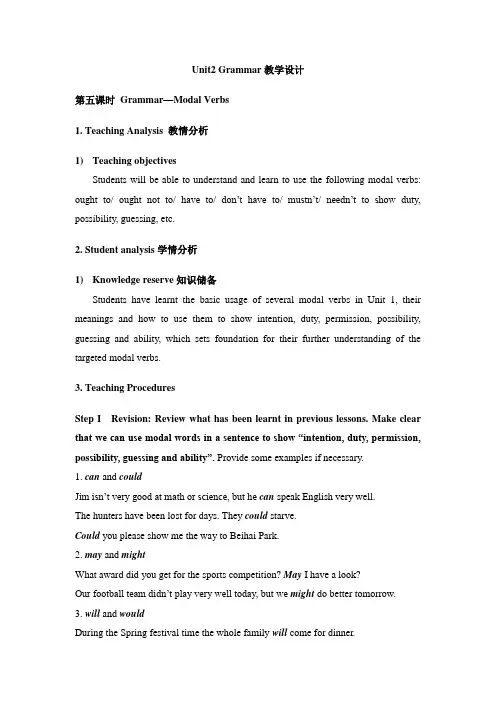
Unit2 Grammar教学设计第五课时Grammar—Modal Verbs1. Teaching Analysis 教情分析1)Teaching objectivesStudents will be able to understand and learn to use the following modal verbs: ought to/ ought not to/ have to/ don’t have to/ mustn’t/ needn’t to show duty, possibility, guessing, etc.2. Student analysis学情分析1)Knowledge reserve知识储备Students have learnt the basic usage of several modal verbs in Unit 1, their meanings and how to use them to show intention, duty, permission, possibility, guessing and ability, which sets foundation for their further understanding of the targeted modal verbs.3. Teaching ProceduresStep I Revision:Review what has been learnt in previous lessons. Make clear that we can use modal words in a sentence to show “intention, duty, permission, pos sibility, guessing and ability”. Provide some examples if necessary.1. can and couldJim isn’t very good at math or science, but he can speak English very well.The hunters have been lost for days. They could starve.Could you please show me the way to Beihai Park.2. may and mightWhat award did you get for the sports competition? May I have a look?Our football team didn’t play very well today, but we might do better tomorrow.3. will and wouldDuring the Spring festival time the whole family will come for dinner.My uncle was poor but liked fashion, so he would often dress up as a rich man.Are you free this Saturday? Would you like to join my family for dinner?4. shall and shouldThe harvest festival begins on Sunday. We shall be there with our friends before that. When going by plane, you should arrive at the airport at least one hour early.It’s nearly time for class to start. The teacher should be here soon.5. must and can’tWhen you eat fish, you must be careful with bones.Wang Feng has won the English competition three times. He must be very smart.A man landed on Mars? You must be joking. That can’t be true.习”使用Step ⅡUnderline the sentences containing modal verbs in the reading passage and label each sentence with the function of the modal verbs used—intention, duty, permission, possibility, guessing and ability. (page13, Exercise 1)1. Underline the sentences containing modal verbs in the reading passage and use the function words below to explain the meaning of modal verbs.Suggested answers:Then by lunchtime they would all be sold. (possibility)By now his restaurant ought to be full of people. (possibility)What could have happened? (possibility)Something terrible must have happened if… (guessing)I’ll help you lose weight… (intention)He could not believe his eyes. (ability)Perhaps he should go to the library and find out. (duty)He could not have Yong Hui getting away with telling people lies! (intention)He had better do some research. (duty)Even though her customers might get thin after eating Yo ng Hui’s food. (possibility) They would become tired very quickly. (possibility)…could win his customer back. (ability)Step ⅢExplain the meaning and basic usage of the following modal verbs:动”使用,以及时巩固已学知识。
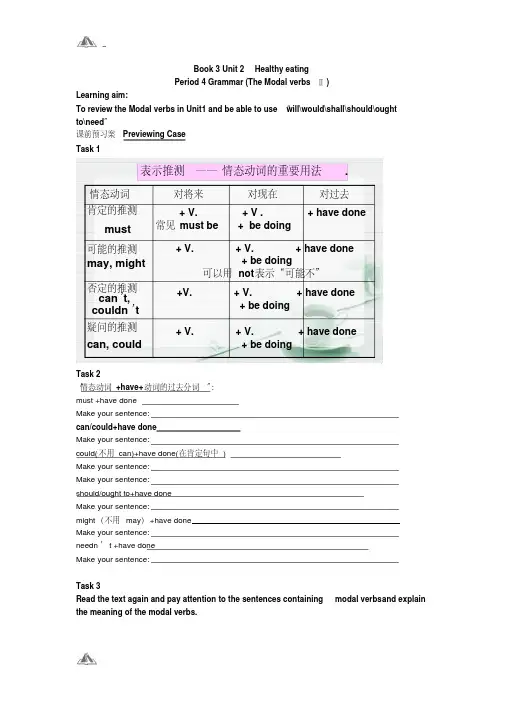
Book 3 Unit 2Healthy eating Period 4 Grammar (The Modal verbs Ⅱ)Learning aim: To review the Modal verbs in Unit1 and be able to use “will\would\shall\should\ought to\need ”课前预习案Previewing CaseTask 1表示推测——情态动词的重要用法.肯定的推测可能的推测否定的推测疑问的推测must对将来对现在对过去情态动词may, might can ’t, couldn ’t can, could+ V.+ V . + have done 常见must be + be doing + V. + V. + have done+ be doing可以用not 表示“可能不”+V. + V. + have done+ be doing+ V. + V. + have done+ be doing Task 2“情态动词+have+动词的过去分词”:must +have doneMake your sentence:can/could+have doneMake your sentence:could(不用can)+have done(在肯定句中)Make your sentence:Make your sentence:should/ought to+have doneMake your sentence:might (不用may )+have doneMake your sentence:needn ’t +have doneMake your sentence:Task 3Read the text again and pay attention to the sentences containingmodal verbs and explainthe meaning of the modal verbs.课堂探究案Exploring Cases探究点一: will和would:1. will是助动词或是情态动词?Will作助动词Will作情态动词I will tell you something important.Will you tell her that I'm here?2. 在疑问句中用于第二人称,提出请求或询问。
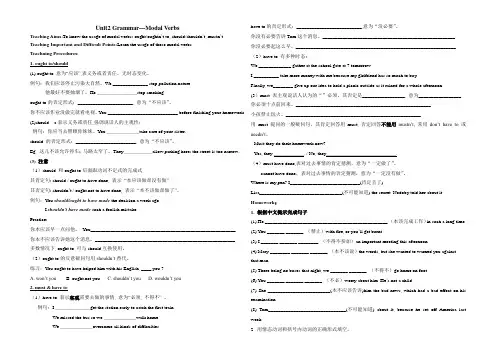
Unit2 Grammar---Modal VerbsTeaching Aims:To know the usage of modal verbs: ought/oughtn’t to, should/shouldn’t, mustn’t. Teaching Important and Difficult Points:Learn the usage of these modal verbs.Teachning Procedures:1. ought to/should(1) ought to 意为“应该”,表义务或者责任。
无时态变化。
例句:我们应该停止污染大自然。
We ______________ stop pollution nature.他最好不要抽烟了。
He ________________stop smoking.ought to的否定形式:______________________, 意为“不应该”。
你不应该作业没做完就看电视。
You ____________________________ before finishing your homework.(2)should a.表示义务或责任,强调说话人的主观性:例句:你应当去照顾你妹妹。
You _____________take care of your sister.should 的否定形式:________________________, 意为“不应该”。
Eg. 这儿不该允许停车; 马路太窄了。
They ___________allow parking here; the street is too narrow.(3) 注意(1)should 和ought to后面跟动词不定式的完成式,其肯定句: should / ought to have done, 表示“本应该做却没有做”.其否定句: shouldn’t / ought not to have done, 表示“本不该做却做了”。
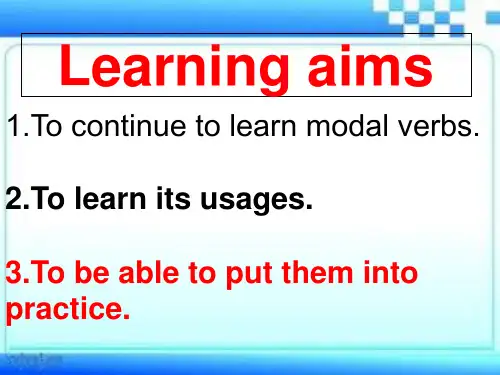
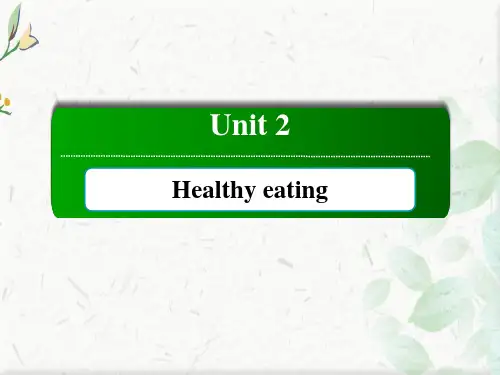
M3 Unit 2 Healthy eatingGrammar: Modal Verbs(Ⅱ)Motto: Eat to live,but do not live to eat. 吃饭是为了活着,但活着不是为了吃饭.I.Learning aims:1.Master the usage of Modal V erbs.2.Master the usage of modal verbs+ have done.Ⅲ. ConsolidationLevel A Complete the task with proper words.1.You ______________ go there alone; it’s too dangerous .(mustn’t/needn’t)2.I ________________ here in time but I met an friend of mine.I stopped and talked him for some time.(could have come/must have come)3.—Shall I leave the room so that you two can talk? —No,you__________________. (mustn’t/needn’t)4.He __________________have missed the train; he arrived at the train station two hours early.(can’t/needn’t)5.We’ll be very glad if you_________________ joining us in going camping.(can/may)6.They _________________ stay in the office last night because of the snowstorm.(have to /must )7.We ____________________ have helped him;in that case,he would have been able to finish the work.(should/can)8.From what you said,she __________________ have told you all about it.(can/must)9.Immediate actions ___________be taken ,like stopping cutting down trees,to better the environment.(may/ought to) Level B Complete the sentences.1.You ______________ private phone calls in work time. 在工作时间你不应该打私人电话。